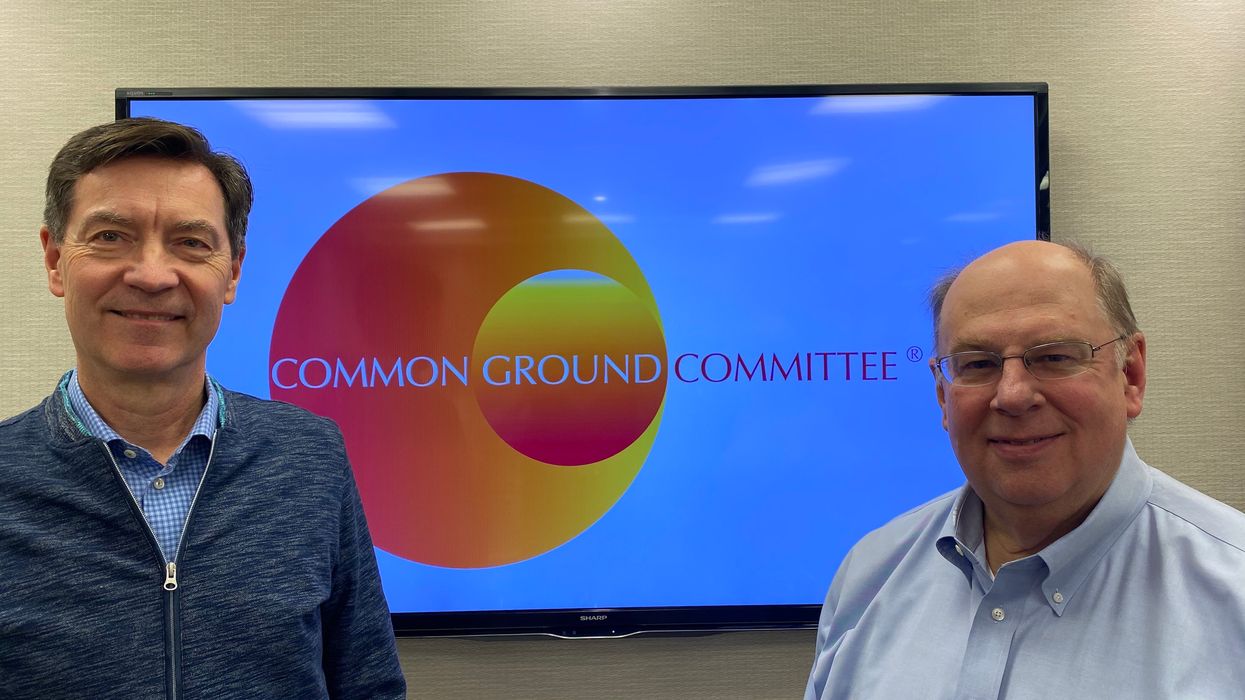The entire staff of The Fulcrum is saddened to learn of the passing of Bruce Bond, CEO of Bridge Alliance member Common Ground Committee, on Dec. 27.
Seven years ago Bruce Bond, Erik Olsen and a group of concerned citizens from New York and Connecticut were brought together by their common desire to improve the tenor of public discourse on topics of concern in our country and the world. While the idea for the Common Ground Committee had been bandied about between Bruce and Erik for years, it was this group of friends that formed the Common Ground Committee. Bruce served as CEO and board chairman, then went on to network and lead in the larger bridging movement.
Bruce was a true visionary, believing that people of goodwill can and must engage in constructive dialogue about the many challenges facing our country and society today. Bruce and Erik’s friendship enjoyed vigorous debates about politics, economics, current events and music. On a joint family vacation in 2009, while bemoaning the angry tenor of public discourse, they conceived of the need for public forums and other discussions where prominent figures from opposing ends of the political spectrum could reveal their shared areas of agreement on polarized policy issues. This was the seed that became CGC with support from their friends.
Bruce had an impressive business career before co-founding Common Ground Committee but when asked in an interview with The Fulcrum in February 2020 what his biggest professional triumph was, he did not hesitate to discuss his bridging work:
"Nothing in my career has been more satisfying than obtaining the recognition, funding and personnel that enabled Common Ground Committee to move from a bootstrapped, volunteer-only startup to a strong, growing and talent-rich organization."
In a stroke of genius and generosity, Bruce and the CGC team developed the Common Ground Scorecard, to provide a way for citizens to see, with a single score, how effectively their elected officials and candidates for office embody the spirit and practice of a Common Grounder. Or not. In meetings on Capitol Hill, members of Congress became concerned when their CGC scores were low and what that meant for them. The scorecard does not assess issue positions, ideology or any other qualifications.
This tool is just one example of the many groundbreaking projects Bruce and Erik pioneered. Together they have produced over 60 podcasts, titled “Let’s Find Common Ground,” that explore the path to more progress and less division, working with journalists, top thought leaders and voices from all sides of the political spectrum.
Donna Brazile, ABC News contributor and former chair of the Democratic National Committee participated in a CGC event and a later podcast with former Republican National Committee Chair Michael Steele. She spoke about the work of the Common Ground Committee:
"Our two-party system is caught in an endless loop to win voters, but not build up our ability to find common ground. That is, we are in an unending loop where each side regards the other as an inherently hostile opponent who is unfit to govern the country, or even to be considered American. The Common Ground Committee stands almost alone in the public forum to emphasize the values this nation is founded upon: equality, the rule of law, equal opportunity, a government of, by, and for the People. We must change the focus of the public mind from dwelling on hostile, exclusionary divisions to focusing on the common values and virtues that unite us. I don't know of any work underway for the future of this country that is more important than that of the Common Ground Committee.”
Learn more about Bruce’s philosophy and strategy in his discussion with Toby Davis for the UnityNow podcast.
A graduate of Princeton University, Bruce was a business leader with over 30 years of experience in the information technology industry, including an executive position at the world-renowned analyst firm Gartner. He launched several successful software startups, in addition to his roles as industry analyst, software developer and chief information officer.
Bruce could have retired and enjoyed a life of leisure but instead devoted himself to bridging the divides that have created such animosity in American society. He believed that civically engaged citizens working hard together can heal the incivility and polarization that is dividing our nation.
Bruce’s leadership as a healer and uniter will be sorely missed.
The family has asked that in lieu of flowers, contributions be made to the Common Ground Committee. You can do this by texting CGC to 53-555. Or you can visit the website www.commongroundcommittee.org.




















